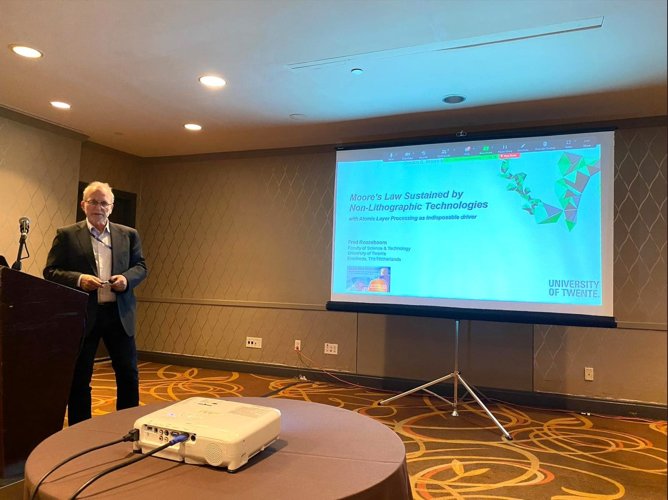Last week, Fred Roozeboom, emeritus professor in the Inorganic Membranes research group, received the Gordon E. Moore Medal for Outstanding Achievement in Solid State Science and Technology from the ElectroChemical Society (ECS). The award includes a silver medal, a plaque, a $7,500 cash prize and a lifetime membership to ECS.
Roozeboom is the first European to receive the medal. He gets the award for his many research projects in micro- and nanoelectronics. With his research, he improved techniques to make chips smaller and smaller and stack them in one compact housing. That research started over forty years ago after he obtained his PhD at UT (then Technische Hogeschool Twente) on monolayers of vanadium oxide.
Non-lithographic technologies
In his more than forty years in this research area, Roozeboom made important contributions to techniques for making chips with ever-shrinking details, namely Rapid Thermal Annealing, Reactive Ion Etching and Atomic Layer Processing. With Reactive Ion Etching, you can etch straight holes in wafers. If you fill those holes with insulating layers and conductive layers in between, you essentially get 3D high-power capacitors on a very small surface area. If you etch holes all the way through, you can cleverly stack and interconnect different (multifunctional) components. This saves a lot of space.
In particular, atomic layer deposition (ALD) and etching (ALE) lend themselves to further reducing details in chip fabrication without falling back on lithography all the time. "Lithography, while fast, is also expensive," Roozeboom explains. ALD and ALE have proved to be the godsend in pushing 'Moore's Law' to sub-10 nm details by the semiconductor industry. Indeed, the latter has not been idle while waiting around 10 years for the economic feasibility of extreme ultraviolet (EUV) lithography.

About Fred Roozeboom
Prof Dr Fred Roozeboom first conducted research at ExxonMobil after his PhD and switched to electronics at Philips Research, NXP, TNO Holst Centre and Eindhoven University of Technology in 1983. He has been back in Twente since 2021. As professor emeritus, he conducts research on the deposition of oxidic monolayers in the Inorganic Membranes research group. He also works as Senior Technical Advisor at the startup Carbyon. There he works on technologies to capture CO2 from air.

Gordon E. Moore Medal
The ECS Gordon E. Moore Medal for Outstanding Achievement in Solid State Science & Technology has been awarded every two years since 1971. In 2005, the award was renamed in honour of former ECS member and Intel founder Gordon E. Moore (1929-2023). Moore is best known to the general public for his economic law, 'Moore's Law'. He stated that the number of transistors in an integrated circuit doubles approximately every two years due to technological progress. That law can be traced back to a meeting of the Electrochemical Society in 1964.





